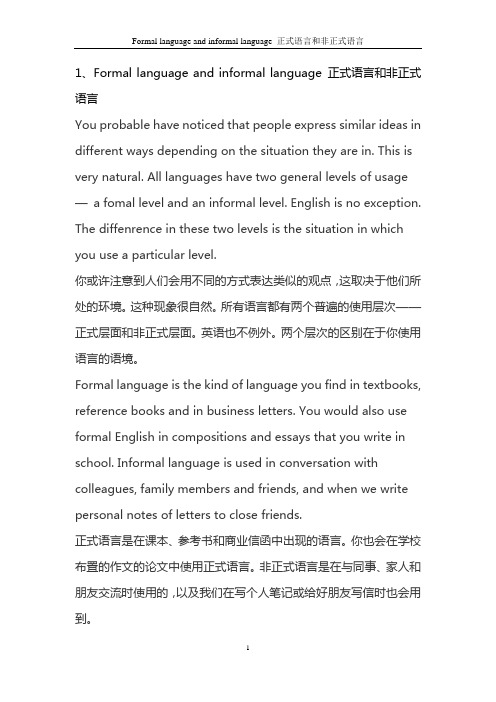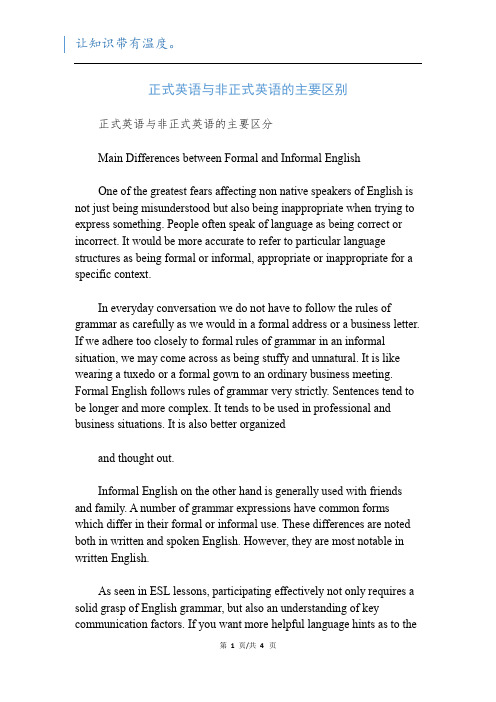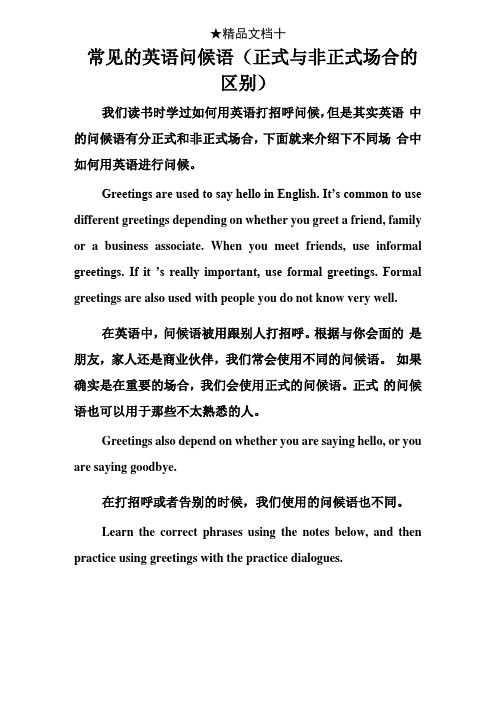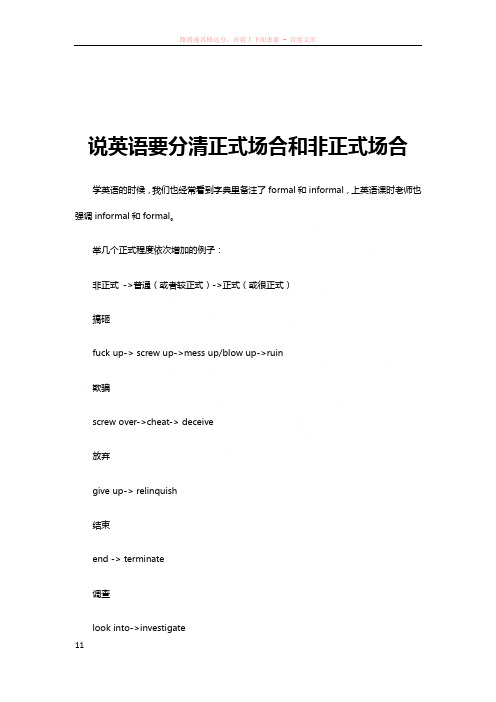正式英语与非正式英语
英语中级听力:Formal language and informal language 正式语言和非正式语言(中英对照)

1、Formal language and informal language 正式语言和非正式语言You probable have noticed that people express similar ideas in different ways depending on the situation they are in. This is very natural. All languages have two general levels of usage —a fomal level and an informal level. English is no exception. The diffenrence in these two levels is the situation in which you use a particular level.你或许注意到人们会用不同的方式表达类似的观点,这取决于他们所处的环境。
这种现象很自然。
所有语言都有两个普遍的使用层次——正式层面和非正式层面。
英语也不例外。
两个层次的区别在于你使用语言的语境。
Formal language is the kind of language you find in textbooks, reference books and in business letters. You would also use formal English in compositions and essays that you write in school. Informal language is used in conversation with colleagues, family members and friends, and when we write personal notes of letters to close friends.正式语言是在课本、参考书和商业信函中出现的语言。
正式英语与非正式英语的主要区别

正式英语与非正式英语的主要区别正式英语与非正式英语的主要区分Main Differences between Formal and Informal EnglishOne of the greatest fears affecting non native speakers of English is not just being misunderstood but also being inappropriate when trying to express something. People often speak of language as being correct or incorrect. It would be more accurate to refer to particular language structures as being formal or informal, appropriate or inappropriate for a specific context.In everyday conversation we do not have to follow the rules of grammar as carefully as we would in a formal address or a business letter. If we adhere too closely to formal rules of grammar in an informal situation, we may come across as being stuffy and unnatural. It is like wearing a tuxedo or a formal gown to an ordinary business meeting. Formal English follows rules of grammar very strictly. Sentences tend to be longer and more complex. It tends to be used in professional and business situations. It is also better organizedand thought out.Informal English on the other hand is generally used with friends and family. A number of grammar expressions have common forms which differ in their formal or informal use. These differences are noted both in written and spoken English. However, they are most notable in written English.As seen in ESL lessons, participating effectively not only requires a solid grasp of English grammar, but also an understanding of key communication factors. If you want more helpful language hints as to themost appropriate forms ofEnglish or key points to take into consideration each time you are usingEnglish, read on.Contracted Forms连写Formal - Don’t use contracted forms, use the entire auxiliary verb: They havelived in New York for many years.Informal - Use contracted forms: They’ve lived in New York for many years.Relative Structures从句Formal - Use relative structures: The woman thought that it was important tobe on time.Informal - Drop certain relative structures: The woman thought it was importantto be on time.The Use of ‘Whom’ “whom"的运用Formal - Use ‘whom’ as an object: Whom have they chosen for the position? Informal - Use ‘who’ as an object: Who have they chosen for the position?Auxiliary Verb Usage助动词的使用Formal - Always use the full form of an auxiliary: Have you finished your work? Informal - Sometimes the auxiliary verb is dropped in informal speech. Note: This is often grammatically incorrect, but is certainly common in everydayusage: Finished your work?Word Choice 动词的挑选Formal - Many words tend to be used in more formal situations. For example,certain verbs tend to be used in formal situations, but have other synonyms (often phrasal verbs) that are used in informal situations. Also, it uses more vocabulary derived from French and Latin (bigger words) It uses moresynonyms and doesn’t repeat the same words as much. The policeinvestigated the situation.Informal synonym: We looked into the situation.Passive structures 被动句Formal - It uses more indirect language, making it less personal. The studentwas given a book.Informal synonym: We gave the student a book.If you liked this article, tell all your friends about it. They’ll thank you for it. If you have a blog or web site, you can link to it or even post it to your own site (don’t forget to mention as the original source).文档内容到此结束,欢迎大家下载、修改、丰富并分享给更多有需要的人。
常见的英语问候语正式与非正式场合的区别

★精品文档十常见的英语问候语(正式与非正式场合的区别)我们读书时学过如何用英语打招呼问候,但是其实英语中的问候语有分正式和非正式场合,下面就来介绍下不同场合中如何用英语进行问候。
Greetings are used to say hello in English. It’s common to use different greetings depending on whether you greet a friend, family or a business associate. When you meet friends, use informal greetings. If it ’s really important, use formal greetings. Formal greetings are also used with people you do not know very well.在英语中,问候语被用跟别人打招呼。
根据与你会面的是朋友,家人还是商业伙伴,我们常会使用不同的问候语。
如果确实是在重要的场合,我们会使用正式的问候语。
正式的问候语也可以用于那些不太熟悉的人。
Greetings also depend on whether you are saying hello, or you are saying goodbye.在打招呼或者告别的时候,我们使用的问候语也不同。
Learn the correct phrases using the notes below, and then practice using greetings with the practice dialogues.利用下面的提示,学习正确的短语用法,然后利用下面的对话来练习问候语。
Formal Greetings:Arriving正式问候语:到达Good morning / afternoon / evening.早上好/中午好/晚上好Hello (name), how are you?嗨(人名),你好吗?Good day Sir / Madam (very formal)先生/太太日安(非常正式)Respond to a formal greeting with another formal greeting.使用正式问候语来回应Good morning Mr. Smith.早上好,史密斯先生。
英语写作中的文体差异

英语写作中的文体差异英语作为一门国际语言,在不同的文化和语境中都有其独特的表达方式。
而与其它语言相比,英语更是拥有多种文体,这也给英语写作带来了更多的选择和挑战。
首先,我们可以看到英语写作中最基础的两种文体:正式和非正式。
正式文体通常在学术、商务等场合中使用,要求语言精准、规范、符合语法和语义规则,并且多采用被动语态和介词短语等较为复杂的句式。
而非正式文体则相对轻松随意,语言更富于表现力和口语化,多用简单句和俚语来表达言辞。
我们可以通过以下两个例子来感受这种不同:正式文体例子:The user experience of this product ought to be optimized in order to achieve an optimal level of satisfaction among customers.非正式文体例子:This product should feel good to use so that more people want to buy it and recommend it to their friends.显然,正式文体更适用于需要呈现严谨、专业和严肃的场合,如学术论文、商务合同等;而非正式文体更适用于需要表达轻松愉悦、亲切和随意的场合,如个人日记、社交媒体等。
除此之外,英语写作中还存在各种专门的文体,如散文、诗歌、小说、科幻等。
这些文体都有自己独特的特点和风格。
例如,散文通常以自由流畅的句子和修辞手法为主,试图表达作者内心的情感和思想;而诗歌则更强调押韵、韵律和音乐性,意在创造出优美的声音效果。
此外,在不同文化和语境中,英语写作也存在着更为细微的文体差异。
例如,在美国和英国的英语写作中,常用的单词、句法和修辞手法都略有不同。
在美国英语中,常使用第一人称代词“I”和“we”,而在英国英语中则多用第二人称代词“you”和第三人称代词“one”。
在句子结构上,美国英语更为简洁明了,而英国英语则更偏重于修辞和间接表达。
英语中常见的正式表达方式与非正式表达方式

在正式的场合需要使用正式的表达方式,表达敬意和严谨;在非正式场合使用非正式的表达方式,拉近彼此之间的距离,提高谈话的弹性和舒适性,以下列举常见的正式表达方式与对应的非正式表达方式。
1. 你好吗?How do you do? >>——-<< What’s up?解析:What's up 的发音还可以是 wassup 或 whaddup,在非正式场合中,”What's up“ 是一个非常随便的问候语,表面上译为”怎么了或发生什么事了“,实际上不涉及对某些事的具体更新信息,相当于 what is the matter 或 what is happening,例如:'What's up?', I said to him.—'Nothing much,' he answered.“怎么了?”,我对他说。
—没什么,他回答。
2. 很高兴见到你It is a pleasure to meet you >>——<< Nice to meet you3. 在你方便的时候尽早At your earliest convenience >>——<< As soon as you can4. 担心你,关心你Concerned about you >>——<< Worried about you5. 首先Firstly , >>——<< To start with/…, For a start6. 代我向…问好Give my regards to >>——<< Say hello to7. 你最近有她的消息吗?Have you heard from her lately? >>——<< Heard from her lately?8. 你看到过汤姆吗?Have you seen Tom? >>——<< Seen Tom?9. 我同意安娜…的看法/安娜是正确的I agree with my colleague, Anna, that… >>——<< Anna’s right.10. 我想提醒你的是…I would like to remind you that… >>——<< Don’t forget11. 非常感谢I appreciate your assistance ! >>——<< Thanks a lot!12. 由于…In light of the fact that >>——<< Because13. 我认为…It is my opinion that… >>——<< I think…14. 我需要做…It is necessary for me to… >>——<< I need to…15. 你不必…It is not necessary for you to… >>——<< You don’t hafta (不得不,只好)…16. 我们建议…It is recommended >>——<< We recommend17. 很抱歉,…/因…,很抱歉Please accept our apologies for… >>——<< Sorry…18. 而且,此外Secondly/ Besides / Furthermore, >>——<< Another good thing is/ What’s more/ Not only that,19. 最后Lastly, >>——<< And one of the best things is…/ And best of all, / The most important thing is…20. 她能…She has the ability >>——<< She can21. 该计划已付诸实践The plan was implemented / carried out >>——<< They put the plan into action22. 我们的目的地Our destination >>——<< The place where we want to go23. 我很抱歉地通知你…I regret to inform you of… >>——<< I’m sorry to tell you that…24. 你能…I was hoping that you could… >>——<< Could you…?25. 不成问题It will cease to be a problem >>——<< It won’t be a problem anymore26. 人们开始厌倦这些事。
立刻说说英语要分清正式场合和非正式场合

说英语要分清正式场合和非正式场合学英语的时候,我们也经常看到字典里备注了formal和informal,上英语课时老师也强调informal和formal。
举几个正式程度依次增加的例子:非正式->普通(或者较正式)->正式(或很正式)搞砸fuck up-> screw up->mess up/blow up->ruin欺骗screw over->cheat-> deceive放弃give up-> relinquish结束end -> terminate调查look into->investigate继续go on-> proceed/continue可是,到底什么是正式场合呢?有人觉得书面的就是正式用语;有人觉得工作中用正式用语,和朋友聊天就是非正式场合;有人觉得开会,演讲、上电视就是正式用语。
但是实际工作和生活中,发现也不完全是。
书面沟通中,老外写邮件里也有用screw up 这种词的,在邮件里用过relinquish也会被老外吐槽在装逼。
老外用look into也比investigate多。
开会的时候老外说fucking idea,也很常见(当然仅在只有男性在场的时候),更别提平时说I‘ll shoot you an email或者ballpark number.那到底怎么区分正式场合非正式场合呢?有以下两种区分方法。
一、看你和别人的熟悉程度。
上文说的,非正式用语是拉近距离,给人一种是自己人的感觉。
大家都很熟时,几乎不管什么场合,可以用非正式的词。
和老板或者同事都非常熟,就算是开会这种很正式的场合也可以。
发邮件也一样,如果很熟那你用非正式用语没关系,如果是群发(考虑到有不熟的人),那你用词还是要稍微正式(普通)一点。
陌生人、新同事、刚接触不久的老板或者客户,一开始就套近乎不太好只会显得没素质,一般用较正式(普通)的词,表示尊重。
非正式英语 正式英语

非正式英语正式英语What’s your name? May I have your name?您贵姓?请问您贵姓大名?Do you want some tea? Could you like some tea?您要喝茶吗?请问您想喝茶吗?Over here, please. Could you come this way please?这边请。
请您往这边走好吗?* 不要说OK, Sure, Yeah等等,而要说Certainly, Sir.* Hey, uh-huh, Hang on 等等,也不适合在酒店中使用。
* 别说“I don’t know.”回答“不知道”是非常不礼貌的说法。
可以说“just a moment, please. I’ll check that for you.” (请稍候,我来帮您确认),然后请有能力处理的人前来协助。
* 对男性客人,尊称为Sir; 面对女性客人时尊称为Ms.在招呼客人时,最好说“Excuse me, Sir(Ms)”, 不要直接称呼Mr.或Ms. 至于称呼小孩,可以直接使用Excuse me,但是不可以直接称呼boy或girl.* 正视对方的眼睛,以显示出你的信心和诚意。
但必须注意,注视对方的眼睛,并不是无理地盯着对方看。
* 在面对语言不通的外籍人士时,一定要多加利用手势和肢体语言。
但是使用手势时要特别小心,因为对于不同国家、民族而言,手势的意义也大不相同。
二.基本待客英语(一)在正式的英语表现里,疑问基本句型可分为下列四种:1. May I ~2. Could you ~3. Would you ~4. Shall I ~?只要理解这四种基本的句型,就可以处理大部分业务上的状况。
1.自己要做什么事时,就使用May I ~May I have your name, please?请问尊姓大名May I have your check-out time, please?请问您什么时候结帐离开?May I see your passport, please?请让我看一下您的护照好吗?May I know your nationality, please?请问您的国籍是什么?2.麻烦客人时,可使用Could you ~Could you fill out the form, please?请您填写这张表格好吗?Could you write that down, please?请您写下来好吗?Could you draft the fax, please?请您写下传真的草稿好吗?Could you hold the line, please?请不要挂电话好吗?3.询问客人的喜好或是做什么时,可使用Would you ~Would you like tea or coffee?请问您要喝茶还是咖啡?Would you like to take a taxi?请问您要搭计程车吗?Would you mind sitting here?请问您介意坐在这里吗?** 只要在疑问词后加“Would you ~”,就可以提出大部分的询问。
正式英语和非正式英语

正式英语和⾮正式英语⼤家平时接触到的,熟悉的基本都是⾮正式英语,正式英语更严肃,⽤的单词较长也相对不太常见。
但是有时候⼯作中还是要⽤到formal english,所以简单介绍⼀下。
⼀、正式英语正式英语主要应⽤于写作,学术课本,⼤学论⽂,商业信函和合同中。
官⽅或者正式场合。
特点:⽐informal english使⽤更多的复杂词汇。
⽐如compensate补偿,ascend上升,interrogate审问。
常常使⽤单个动词(⽐如establish)来代替动词短语(⽐如set up)。
formal english⽤在写作中,句⼦⼀般较长,较复杂,严格遵循语法规则。
⽐较客观,经常使⽤it这样的⾮⼈称代词和动词的被动形式。
避免缩略词和缩写单词。
就连标点符号也⽐较正式,避免⽤分号(;)和冒号(:)⼆、⾮正式英语informal english基本就是⽇常⽤语和⼀些流⾏英语。
⽐较随意,对词汇的选择不太在意。
特点:⽐formal english使⽤较短的单词,⽐如fire,climb,ask。
使⽤很多⼝语词汇。
⽐如stuff,a lot of, thing,sort of经常使⽤⼀些动词短语较短,语法要求也没有formal english严格写作相⽐formal english更个⼈化,常⽤第⼀,第⼆⼈称(I,you,we)。
经常缩写单词(如常常使⽤it’s,⽽不是 it is)分号(;)和冒号(:)可以⽤Tips:俚语是informal english,不适合在礼节性的演讲和正式场合⽤。
俚语常是在固定的社会团体或职业⼈群使⽤。
三、把⾮正式英语转为正式英语有时候⼯作中发邮件不能向平时说话那么随意,我们需要把formal enlish 改成informal english,关键的关键是把动词短语改成单个动词。
要求 ask for -> request建⽴ set up -> establish发现 find out -> discover处理 deal with -> handle欺骗 take in -> deceive下⾯是⼀些例句⾮正式⽤语正式⽤语他调查了(checked up on)他的会计。
- 1、下载文档前请自行甄别文档内容的完整性,平台不提供额外的编辑、内容补充、找答案等附加服务。
- 2、"仅部分预览"的文档,不可在线预览部分如存在完整性等问题,可反馈申请退款(可完整预览的文档不适用该条件!)。
- 3、如文档侵犯您的权益,请联系客服反馈,我们会尽快为您处理(人工客服工作时间:9:00-18:30)。
从句比不定式的形式正式 It is important that we should do it (for us to do it). It seems that he is a teacher. (He seems to be a teacher.)
3) 和kind 连用的名词单数比复数正式。 This kind of dog (These kinds of dogs are) is easy to train. I like most kind of cat (cats).
句子结构
➢倒装句比不倒装句正式。 Had I known it (If I had known it) I would have told you. Hardly have I seen this. (I have hardly seen this.)
Summary
就像中文一样,英语里面也分正式和非正式用法。对于新手来说,弄错用错是非常正常的。 为了要达到熟练把握这两者的区别和用法场合上的不同,需要长期的努力。但是,有一些 最基本的,最直接的区别还是能够让人一目了然。下面就列出几条。
1、简单句通常是用在非正式环境。 2、过去分词,独立主格结构,动名词形式作修饰通常用在正式环境。 3、排比,修辞,并列句通常用在正式场合。 4、Anglo-Saxon词源的词一般用在非正式场合。 5、French,Greek,Latin词源的词一般是用在正式场合,而且通常为多音节词。 6、Have not, Must not, Can not等在正式场合不能缩写为haven't, mustn't, can't。 7、非正式场合who可以替代whom。 8、非正式场合,在虚拟语气中,当主语是I,he的时候谓语可以用was代替were。 9、俚语,口语表达用在非正式场合。 10、动词词组通常表示非正式的意思,为了表示正式意思可以找到相近意思的词代替
词源
❖ 人们在什么场合选择什么样正式程度的词语, 是一个十分重要的问题。 根据现代语言学研究的结果, 可根据词语的正式程度, 把词语大致分四类:
(1) 深奥词。 大多数深奥词来自拉丁语、法语和希腊语, 使用的场合一般较为正式。
(2) 大众词。
此类词语在正式或非正式的场合中使用最广泛,使用频度最高, 是人们在每天的 交际中必不可少的语言。
3) 指时间和地点的从句 `Prep + which' 比 `when' and `where' 从句正 式。 This is the place in which (where ) I worked. That is the day on which (when) I came.
II. 人称代词
2) 在定语从句中作主语和宾语的关系词`Who' `whom' and `which'比 `th at' 正式。 He is the person who (that) is well-known all over the country. This is the book which (that) I bought yesterday. I know the person whom (that) you spoke to.
句子结构
➢状语
1) 时间,原因和条件状语可以用非谓语动词的形式,也可以用状语 从句的形式,一般的说,非谓语动词形式比状语从句形式正式。
Being (As he was) a farmer, he had to get up early. W eather permitting (If weather permits), we shall go.
Thank you !
III. 指示代词
1) 当`This' 和 `that'都是后指时,'that' 比 `this' 正式。 That (This) is what I thought.
2.)`that / those' 作为先行词比名词正式。 Those flowers are better than those which (the flowers) we planted last year.
句子结构
➢主谓一致
1) 单数比复数正式。 None / Neither of them has (have) arrived yet.
2) 复数比单数正式。 If I were (was) you I would do that. Neither his wife nor his child have (has) arrived. There are (is) hundreds of people outside.
(3) 口语词。
指非正式谈话和写作中所使用的亲昵的词语、短语、习语等。这些词语和习语 被认为不适合在礼貌的会话或正式通信场合中使用。
(4) 理语词。
最不正式的一种语言。供青年人、社会行业之间交际时所使用的“ 行话” 。 对此类词语的使用要十分慎重, 尤其不宜在正式的社交场合中使用。但是, 由于理语 具有创新、生动和传播迅速的特点, 因此, 目前, 便语似呈使用范围日渐扩大的趋势。
eg. As we (I) showed in Chapter One, it is not an easy question
. One (You) never knows what may happen.
6) 在复合句中,主句和从句中的 d.
主语出现名词和代词时,主句中 d.)
The plane took off as soon as it had refuele (It took off as soon as the plane had refuele
2.短语动词: pick up,give up,go on with ,fall out,look into
正式使用单个动词
正式: 1.词汇: explode,reduce,position, fatigurd
2.短语动词: choose,abandon, continue,quarrel,investgate
2. A lot of slang(大量的俚语) 3. Simple sentences(简单的句子) 4.常用第一,第二人称(例如I ,you, we) 5. Acronyms(缩写单词,如常常使用it’s)
词比较
非正式使用短语动词
非正式: 1. 词汇: blow up,cut down,job, tired
➢不省略的形式比省略的形式正式。
I know that he is a famous writer. He is a person whom I have known for several years.
➢介词前提比介词结尾的句子正式。 He is a person on whom we can rely (whom we can rely o n).
1) 通常在比较级中主格比宾格正式。 eg. He is taller than I (me). Who is there ? It is I.(me)
2) 在动名词前,所属格比主格正式。 eg. Do you mind my (me) smoking? I am surprised at his (him) making that mistak
e.
3) 单数人称代词比复数正式。
eg. Everyone should do his (their) duty.
Give me (us) a kiss, darling.
Everyone thinks he knows (they know) the answer.
4) 指作者本人用 `We' 比 `I' 正式。 5) 泛指人时,`One' 比 `you' 正式。
非正式英语(Informal English ) 又称口头英语( Spoken English) , 或日常 交谈语体。其特点是多少有些脱离标准语言规范, 用词比较自由, 句型结构比较 简单。作者和读者( 听者) 之间试图建立一种随和的、轻松的、密切的关系。 语言的环境多种多样, 谈话人之间的关系千差万别。因此, 口头用语可分为两类: 规范口头语体和亲昵口头语体
代词和动词的被动形式)
5.Avoiding Acronyms and abbreviations words
(尽量避免缩略语和缩写单词的出现)
非正式英语词汇的使用
1. short of Words (较短的单词),oral vocab ulary(口语词汇),phrasal verb(短语动词 )
I'll get back as quickly (quick) as I can. He read loudly (loud). I guessed rightly (right).
4) 让步状语从句 `how (who, when, what) ever' 的形式
比 no matter how (who, when, what) 的形式正式。
With what did he write it? (What did he write it with?
句子结构
情态动词 1) 用于请求时,`May' 比 `can' 正式。 May (Can) I use your bike? 2) 用于请求时,`Would' 和 `Could' 比 `will' 和 `can' 正式。 Would / Could ( Will / Can) you like to give a speech?
